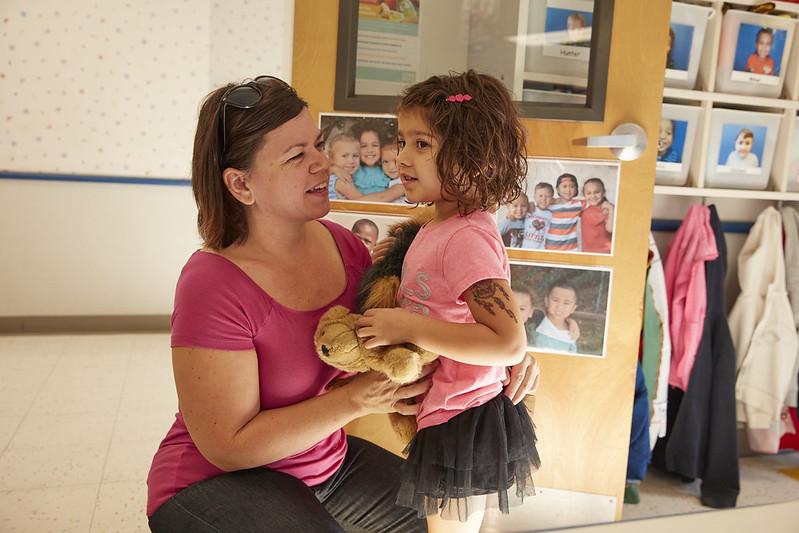
Unlocking Meaningful Conversations: Tips for Engaging with Your Child as School Begins
As summer fades and the school year kicks off, many parents find themselves on a quest to navigate the often-awkward post-school routine of daily check-ins. It’s a familiar scene: kids stumble through the door, exhausted from a long day filled with new teachers, challenging subjects, and potential social obstacles. Parents dutifully ask the inevitable question: “How was your day?” Only to be met with mumbled responses or the classic “Fine.” However, this ‘parental pursuit of conversation’ doesn’t have to be a dead-end; it can transform into an opportunity for deeper connection and understanding.
Revamping the Classic Question
Instead of relying on the standard, often uninformative question, consider rephrasing it to ignite curiosity and engagement. Ariel Bronson, a KinderCare Inclusion Services Advisor, emphasizes the importance of being strategic in how we communicate with our children. Rather than starting with, “How was your day?” try asking, “What was the most interesting thing you learned today?” or “Did anything surprise you today?” These alternatives can pique your child’s interest and encourage them to share stories that might otherwise go untapped.
Leverage Everyday Moments for Connection
Bronson further suggests that parents don’t have to designate a particular time for meaningful conversations. Life is bustling, and those moments often arise in the most unexpected places. For instance, while cooking dinner or during a car ride home, families can utilize these casual settings to foster communication. Sharing experiences during these moments can lead to more relaxed and open discussions, allowing children to express themselves without the pressure of a formal Q&A session.
Understanding Child Emotions
As children transition back to school, it’s natural for them to experience jitters and anxieties. These feelings could stem from anything—social pressures, academic challenges, or simple apprehension about meeting new classmates. Parents can play a crucial role in helping them navigate these emotions. Take a step beyond surface-level chats; encourage your child to articulate their feelings. Ask them how they felt about their day rather than what happened. Questions like “What made you laugh today?” or “Did anything make you feel nervous?” can create an emotional dialogue that fosters vulnerability and trust.
Creating a Safe Space for Sharing
For conversations to flourish, kids need to know that they can speak candidly without fear of judgment. Create an environment where your child feels safe to express their thoughts and feelings. Validate their experiences by listening attentively and responding with empathy. Avoid jumping in with solutions right away; instead, acknowledge what they are expressing and ask follow-up questions to encourage them to delve deeper.
Using Active Listening Techniques
Active listening is crucial in nurturing an ongoing dialogue with your child. Show them that you value their opinions by making eye contact, nodding in acknowledgment, and repeating back what you’ve heard to confirm understanding. This practice not only shows your child that you care about what they’re saying but also encourages them to keep sharing.
Interactive Activities to Boost Conversations
Incorporating interactive activities into your family routine can unlock new conversation pathways. Game nights or family discussions about favorite movies can serve as fun, non-threatening ways to engage. For instance, try a game of “Would You Rather?” or share a story around the dinner table where each member adds a sentence. These activities stimulate creativity and can lead to surprising revelations about your child’s thoughts and views.
Establishing Rituals for Open Communication
Turning mealtime or bedtime into a dedicated family check-in can also yield fruitful results. For example, you might incorporate a “high and low” sharing session at dinner where each family member discusses one high point and one low point of their day. This structured routine encourages children to reflect on their experiences and share them in a supportive context.
In Conclusion: Building Lasting Connections
As parents, fostering meaningful dialogue with children can significantly strengthen your relationships, especially as they navigate the transition back to school. With a few adjustments to your approach—on-the-fly questions, everyday moments, and an openness to listen—you can transform mundane conversations into gateways for deeper understanding. This back-to-school season isn’t just about academics but also about nurturing emotional well-being and connection within families. So, as the school year begins, gear up to turn those everyday conversations into rich, engaging dialogues that will resonate for years to come.

